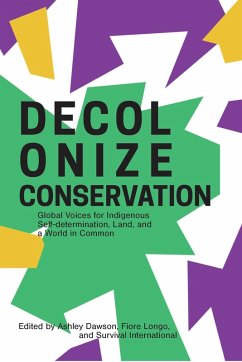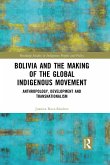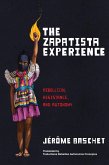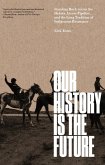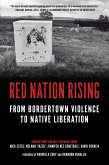Decolonize Conservation (eBook, ePUB)
Global Voices for Indigenous Self-Determination, Land, and a World in Common
Redaktion: Dawson, Ashley; International, Survival; Longo, Fiore
10,95 €
10,95 €
inkl. MwSt.
Sofort per Download lieferbar

5 °P sammeln
10,95 €
Als Download kaufen

10,95 €
inkl. MwSt.
Sofort per Download lieferbar

5 °P sammeln
Jetzt verschenken
Alle Infos zum eBook verschenken
10,95 €
inkl. MwSt.
Sofort per Download lieferbar
Alle Infos zum eBook verschenken

5 °P sammeln
Decolonize Conservation (eBook, ePUB)
Global Voices for Indigenous Self-Determination, Land, and a World in Common
Redaktion: Dawson, Ashley; International, Survival; Longo, Fiore
- Format: ePub
- Merkliste
- Auf die Merkliste
- Bewerten Bewerten
- Teilen
- Produkt teilen
- Produkterinnerung
- Produkterinnerung

Bitte loggen Sie sich zunächst in Ihr Kundenkonto ein oder registrieren Sie sich bei
bücher.de, um das eBook-Abo tolino select nutzen zu können.
Hier können Sie sich einloggen
Hier können Sie sich einloggen
Sie sind bereits eingeloggt. Klicken Sie auf 2. tolino select Abo, um fortzufahren.

Bitte loggen Sie sich zunächst in Ihr Kundenkonto ein oder registrieren Sie sich bei bücher.de, um das eBook-Abo tolino select nutzen zu können.
Frontline voices from the worldwide movement to decolonize climate change and revitalize a dying planet.
With a deep, anticolonial and antiracist critique and analysis of what conservation currently is, Decolonize Conservation presents an alternative visionone already workingof the most effective and just way to fight against biodiversity loss and climate change. Through the voices of largely silenced or invisibilized Indigenous Peoples and local communities, the devastating consequences of making 30 percent of the globe Protected Areas, and other so-called Nature-Based Solutions are made…mehr
- Geräte: eReader
- mit Kopierschutz
- eBook Hilfe
- Größe: 3.25MB
Andere Kunden interessierten sich auch für
![Bolivia and the Making of the Global Indigenous Movement (eBook, ePUB) Bolivia and the Making of the Global Indigenous Movement (eBook, ePUB)]() Juanita Roca-SánchezBolivia and the Making of the Global Indigenous Movement (eBook, ePUB)43,95 €
Juanita Roca-SánchezBolivia and the Making of the Global Indigenous Movement (eBook, ePUB)43,95 €![The Zapatista Experience (eBook, ePUB) The Zapatista Experience (eBook, ePUB)]() Jérôme BaschetThe Zapatista Experience (eBook, ePUB)11,95 €
Jérôme BaschetThe Zapatista Experience (eBook, ePUB)11,95 €![Indigenous Writes (eBook, ePUB) Indigenous Writes (eBook, ePUB)]() Chelsea VowelIndigenous Writes (eBook, ePUB)14,95 €
Chelsea VowelIndigenous Writes (eBook, ePUB)14,95 €![Our History Is the Future (eBook, ePUB) Our History Is the Future (eBook, ePUB)]() Nick EstesOur History Is the Future (eBook, ePUB)15,95 €
Nick EstesOur History Is the Future (eBook, ePUB)15,95 €![Red Nation Rising (eBook, ePUB) Red Nation Rising (eBook, ePUB)]() Nick EstesRed Nation Rising (eBook, ePUB)5,99 €
Nick EstesRed Nation Rising (eBook, ePUB)5,99 €![Our History Is the Future (eBook, ePUB) Our History Is the Future (eBook, ePUB)]() Nick EstesOur History Is the Future (eBook, ePUB)11,95 €
Nick EstesOur History Is the Future (eBook, ePUB)11,95 €![The Sound of Silence (eBook, ePUB) The Sound of Silence (eBook, ePUB)]() The Sound of Silence (eBook, ePUB)26,95 €
The Sound of Silence (eBook, ePUB)26,95 €-
-
-
Frontline voices from the worldwide movement to decolonize climate change and revitalize a dying planet.
With a deep, anticolonial and antiracist critique and analysis of what conservation currently is, Decolonize Conservation presents an alternative visionone already workingof the most effective and just way to fight against biodiversity loss and climate change. Through the voices of largely silenced or invisibilized Indigenous Peoples and local communities, the devastating consequences of making 30 percent of the globe Protected Areas, and other so-called Nature-Based Solutions are made clear.
Evidence proves indigenous people understand and manage their environment better than anyone else. Eighty percent of the Earth's biodiversity is in tribal territories and when indigenous peoples have secure rights over their land, they achieve at least equal if not better conservation results at a fraction of the cost of conventional conservation programs. But in Africa and Asia, governments and NGOs are stealing vast areas of land from tribal peoples and local communities under the false claim that this is necessary for conservation.
As the editors write, This is colonialism pure and simple: powerful global interests are shamelessly taking land and resources from vulnerable people while claiming they are doing it for the good of humanity.
The powerful collection of voices from the groundbreaking Our Land, Our Nature congress takes us to the heart of the climate justice movement and the struggle for life and land across the globe. With Indigenous Peoples and their rights at its center, the book exposes the brutal and deadly reality of colonial and racist conservation for people around the world, while revealing the problems of current climate policy approaches that do nothing to tackle the real causes of environmental destruction.
Hinweis: Dieser Artikel kann nur an eine deutsche Lieferadresse ausgeliefert werden.
With a deep, anticolonial and antiracist critique and analysis of what conservation currently is, Decolonize Conservation presents an alternative visionone already workingof the most effective and just way to fight against biodiversity loss and climate change. Through the voices of largely silenced or invisibilized Indigenous Peoples and local communities, the devastating consequences of making 30 percent of the globe Protected Areas, and other so-called Nature-Based Solutions are made clear.
Evidence proves indigenous people understand and manage their environment better than anyone else. Eighty percent of the Earth's biodiversity is in tribal territories and when indigenous peoples have secure rights over their land, they achieve at least equal if not better conservation results at a fraction of the cost of conventional conservation programs. But in Africa and Asia, governments and NGOs are stealing vast areas of land from tribal peoples and local communities under the false claim that this is necessary for conservation.
As the editors write, This is colonialism pure and simple: powerful global interests are shamelessly taking land and resources from vulnerable people while claiming they are doing it for the good of humanity.
The powerful collection of voices from the groundbreaking Our Land, Our Nature congress takes us to the heart of the climate justice movement and the struggle for life and land across the globe. With Indigenous Peoples and their rights at its center, the book exposes the brutal and deadly reality of colonial and racist conservation for people around the world, while revealing the problems of current climate policy approaches that do nothing to tackle the real causes of environmental destruction.
Dieser Download kann aus rechtlichen Gründen nur mit Rechnungsadresse in A, D ausgeliefert werden.
Hinweis: Dieser Artikel kann nur an eine deutsche Lieferadresse ausgeliefert werden.
Produktdetails
- Produktdetails
- Verlag: Common Notions
- Erscheinungstermin: 25. April 2023
- Englisch
- ISBN-13: 9781942173915
- Artikelnr.: 67647626
- Verlag: Common Notions
- Erscheinungstermin: 25. April 2023
- Englisch
- ISBN-13: 9781942173915
- Artikelnr.: 67647626
- Herstellerkennzeichnung Die Herstellerinformationen sind derzeit nicht verfügbar.
Since 1969, Survival International has worked in partnership with tribal communities around the world, and together with supporters from over one hundred countries worldwide, to lead hundreds of successful campaigns for tribal peoples’ rights. The movement is helping to build a world where tribal peoples are respected as contemporary societies and their human rights protected. Ashley Dawson is Professor of Postcolonial Studies in the English Department at the Graduate Center / City University of New York and the College of Staten Island (CSI). His latest books include People’s Power: Reclaiming the Energy Commons (O/R), Extreme Cities: The Peril and Promise of Urban Life in the Age of Climate Change (Verso), and Extinction: A Radical History (O/R). Fiore Longo is a Research and Advocacy Officer at Survival International, the global movement for tribal peoples. She is also the director of Survival International France and Spain. She coordinates Survival’s conservation campaign and has visited many communities in Africa and Asia that face human rights abuses in the name of conservation. She has also visited Indigenous communities in Colombia and worked on Survival’s Uncontacted Tribes campaign.
Preface
Give the Land Back
Ashley Dawson
Introduction
Decolonizing Conservation
Fiore Longo
Part I: “In the Name of Nature”: The Crimes and Wrongdoings of Colonial
Conservation
Section One. What Is “Fortress Conservation”?
1. fortress Conservation in Modern Africa: Past and Present
Guillaume Blanc, Historian of the Environment, Rennes 2 University, France
2. Nature Conservation in the Democratic Republic of Congo: from
Policing to Community Conservation
Blaise Mudodosi, Actions Pour La Promotion Et Protection Des Espèces Et
Peuples Menacés (Apem), Democratic Republic of the Congo
3. Fight Against Extinction: The Sengwer Indigenous People’ Struggle
for Land Rights in Kenya
Kipchumba Rotich, Sengwer of Embobut Cbo, Kenya
4. The Post 2020 Agenda and fortress Conservation in India
Neema Pathak Broome, Kalpavriksh, Icca, India
Second Two. The Militarisation of Conservation and Its Impact onIndigenous
Peoples
5. The Politics of Global Funding for Militarisation in Conservation
Professor Rosaleen Duffy, Biosec, United Kingdom
6. The Fight Against Colonial Conservation is a Fight for Millions of
People Across the World
Pranab Doley, Jeepal Krishak Shramik Sangha, Kaziranga National Park,
India
7. Cries and Tears from the Riparian Populations of the Virunga
National Park in the Rutshuru Territory, Democratic Republic of the Congo
Delcasse Lukumbu, Lutte Pour Le Changement (Lucha), Virunga National Park,
Democratic Republic of the Congo
8. Chitwan National Park, Where the Community Are the Best
Conservationists
Birendra Mahato, Community Conservation Nepal, Chitwan National Park, Nepal
9. Our Most Fervent Wish is to Return to the Forest, Our Land
Julien Basimika Enamiruwa, Actions Pour Le Regroupement Et L’auto Promotion
Des Pygmées, Kahuzi-Biega National Park, Democratic Republic of Congo. With
An Introduction By Deborah S. Rogers, Initiative for Equality.
Section Three: 30x30
10. The 30x30 Target and its Impacts on the Rights of Indigenous Peoples:
Why a New Way forward is Needed
Lara Domínguez, Minority Rights Group, United Kingdom
11. Indigenous Peoples Should Be Leaders of Biodiversity Conservation and
Climate Action and Not Victims of its Policies
Archana Soreng, Khadia Activist and Member of Un Secretary General Youth
Advisory Group onClimate Change, India
12. What’s Beyond the Protected Areas System?
Sutej Hugu, Indigenous Taiwan Self-Determination Alliance, Icca, Taiwan
13. Conservation Needs Fundamental Economic and Political Transformation
Ashish Kothari, Kalpavriksh, India
Section Four: The False Solutions to Climate Change
14. Financialization & Sustainable Finance as Guardians of the Status Quo
Frédéric Hache, Green Finance Observatory, Belgium
15. Nature-Based Solutions: Planet Salvation or Planetary Betrayal?
Simon Counsell, Survival International Consultant, United Kingdom
16. Indigenous Zapotec in Between Dispossession and Energetic Colonialism:
The Edf Case in Unión Hidalgo, Oaxaca, Mexico
Norberto Altamirano Zárate, Binniza (Zapoteco) from the Unión Hidalgo
Indigenous Community, Istmo De Tehuantepec, Oaxaca, Mexico
17. The Decolonization of Nature Conservation: We Are Earth, We Are Nature
Josefa Sanchez Contreras, Member of the Zoque People of San Miguel
Chimalapa, Oaxaca, Mexico
18. Climate Change Mitigation and Conservation in India: Solutions Are
False Problems, Too Many and Tree-Less
Dr Bhanumathi Kalluri, Dhaatri, India
19. Displacement and Violation of Human Rights in the Name of Nature in
Petén, Guatemala
Noé Amador, Community Delegate from Laguna Del Tigre and Sierra Del
Lacandón, Guatemala
Section Five. The Role of Media and International Donors
20. International Donors and Biodiversity Conservation: “Our Land Is Not
Your Solution”
Joe Eisen, Rainforest Foundation, United Kingdom
21. The Lion’s Share: Racialized Conservation and Misrepresentation in
Tanzania
Celeste Alexander, Princeton University, United States
22. Failing Miserably
John Vidal, former Environment Editor of the Guardian, United Kingdom
23. What Happens in the Forest Stays in the Forest: The Role of Donor
Agencies in the Current Conservation Effort and Strategies for Making it
More Equitable and Effective
Robert Moise, Independent Anthropologist, United States
Part Two: Decolonial Perspectives and Alternatives
Section One. Why Is It Necessary to Decolonize Conservation?
24. Why We Need to Decolonize Conservation in Africa: Confronting the
Challenges
Mordecai Ogada, Conservation Solutions Afrika, Kenya
25. Indigenous Peoples of French Guiana Are Being Destroyed by
Neocolonialism
Taneyulime Pilisi, Copresident of the Aw Kae Collective for the
Preservation and Development of Kalin’a Culture and Arts, French Guiana
26. Decolonizing Conservation and Development: Hold onto the Land; Their
Grand Designs Will Collapse . . .
Madhuresh Kumar, National Alliance of People's Movements (Napm), India and
Resistance Studies Fellow at the University of Massachusetts.
27. What Decolonizing Conservation Means and Why It Matters
Dina Gilio-Whitaker, Colville Confederated Tribes, United States
Section Two. The Land, Our Future: Indigenous Peoples and their Role in
Protecting the Environment
28. The Decolonization of Thought
Juan Pablo Gutierrez, Organización Nacional Indígena De Colombia
29. I Was Not Born in Chile, Chile Was Born in My Territory
Llanquiray Painemal Morales, Colectivo Mapuche Mawvn, Germany/Chile
30. Indigenous Peoples on the Caribbean Coast of Nicaragua
Lottie Cunningham Wren, Centro Por La Justicia Y Los Derechos Humanos De La
Costa Atlántica De Nicaragua Cejudhcan, Nicaragua
31. It Is We Who Guard the Forest With Our Lives
Tokala Leeladhar, Amrabad Tiger Reserve, India
32. Our Forest Has Been Stolen for Conservation
Mekozi Rufin, Member of Baka Tribe, Republic of Congo
33. We Need to Throw these Conservationists Out of Our forests
JK Thimma, Shaman and Leader from the Jenu Kuruba Tribe, India
Section Three. Towards An Alternative Conservation
34. Towards A Collective “Whole Earth” Vision for the Future of
Conservation?
Robert Fletcher, Professor at Wageningen University, Netherlands
35. The Scheduled Tribes and Other Traditional Forest Dwellers
(Recognition of Forest Rights) Act, 2006: Towards an Alternative
Conservation
Dr Madegowda C, Ashoka Trust for Research in Ecology and the Environment,
Brt Tiger Reserve, India
36. Given All of the Obstacles, How Do We Fight for Our Future?
Esther Wah, Conservation Alliance Tanawthari, Myanmar
37. “Marseille Manifesto: A People’s Manifesto for the Future of
Conservation”
Collective Statement of the “Our Land Our Nature” Congress
Give the Land Back
Ashley Dawson
Introduction
Decolonizing Conservation
Fiore Longo
Part I: “In the Name of Nature”: The Crimes and Wrongdoings of Colonial
Conservation
Section One. What Is “Fortress Conservation”?
1. fortress Conservation in Modern Africa: Past and Present
Guillaume Blanc, Historian of the Environment, Rennes 2 University, France
2. Nature Conservation in the Democratic Republic of Congo: from
Policing to Community Conservation
Blaise Mudodosi, Actions Pour La Promotion Et Protection Des Espèces Et
Peuples Menacés (Apem), Democratic Republic of the Congo
3. Fight Against Extinction: The Sengwer Indigenous People’ Struggle
for Land Rights in Kenya
Kipchumba Rotich, Sengwer of Embobut Cbo, Kenya
4. The Post 2020 Agenda and fortress Conservation in India
Neema Pathak Broome, Kalpavriksh, Icca, India
Second Two. The Militarisation of Conservation and Its Impact onIndigenous
Peoples
5. The Politics of Global Funding for Militarisation in Conservation
Professor Rosaleen Duffy, Biosec, United Kingdom
6. The Fight Against Colonial Conservation is a Fight for Millions of
People Across the World
Pranab Doley, Jeepal Krishak Shramik Sangha, Kaziranga National Park,
India
7. Cries and Tears from the Riparian Populations of the Virunga
National Park in the Rutshuru Territory, Democratic Republic of the Congo
Delcasse Lukumbu, Lutte Pour Le Changement (Lucha), Virunga National Park,
Democratic Republic of the Congo
8. Chitwan National Park, Where the Community Are the Best
Conservationists
Birendra Mahato, Community Conservation Nepal, Chitwan National Park, Nepal
9. Our Most Fervent Wish is to Return to the Forest, Our Land
Julien Basimika Enamiruwa, Actions Pour Le Regroupement Et L’auto Promotion
Des Pygmées, Kahuzi-Biega National Park, Democratic Republic of Congo. With
An Introduction By Deborah S. Rogers, Initiative for Equality.
Section Three: 30x30
10. The 30x30 Target and its Impacts on the Rights of Indigenous Peoples:
Why a New Way forward is Needed
Lara Domínguez, Minority Rights Group, United Kingdom
11. Indigenous Peoples Should Be Leaders of Biodiversity Conservation and
Climate Action and Not Victims of its Policies
Archana Soreng, Khadia Activist and Member of Un Secretary General Youth
Advisory Group onClimate Change, India
12. What’s Beyond the Protected Areas System?
Sutej Hugu, Indigenous Taiwan Self-Determination Alliance, Icca, Taiwan
13. Conservation Needs Fundamental Economic and Political Transformation
Ashish Kothari, Kalpavriksh, India
Section Four: The False Solutions to Climate Change
14. Financialization & Sustainable Finance as Guardians of the Status Quo
Frédéric Hache, Green Finance Observatory, Belgium
15. Nature-Based Solutions: Planet Salvation or Planetary Betrayal?
Simon Counsell, Survival International Consultant, United Kingdom
16. Indigenous Zapotec in Between Dispossession and Energetic Colonialism:
The Edf Case in Unión Hidalgo, Oaxaca, Mexico
Norberto Altamirano Zárate, Binniza (Zapoteco) from the Unión Hidalgo
Indigenous Community, Istmo De Tehuantepec, Oaxaca, Mexico
17. The Decolonization of Nature Conservation: We Are Earth, We Are Nature
Josefa Sanchez Contreras, Member of the Zoque People of San Miguel
Chimalapa, Oaxaca, Mexico
18. Climate Change Mitigation and Conservation in India: Solutions Are
False Problems, Too Many and Tree-Less
Dr Bhanumathi Kalluri, Dhaatri, India
19. Displacement and Violation of Human Rights in the Name of Nature in
Petén, Guatemala
Noé Amador, Community Delegate from Laguna Del Tigre and Sierra Del
Lacandón, Guatemala
Section Five. The Role of Media and International Donors
20. International Donors and Biodiversity Conservation: “Our Land Is Not
Your Solution”
Joe Eisen, Rainforest Foundation, United Kingdom
21. The Lion’s Share: Racialized Conservation and Misrepresentation in
Tanzania
Celeste Alexander, Princeton University, United States
22. Failing Miserably
John Vidal, former Environment Editor of the Guardian, United Kingdom
23. What Happens in the Forest Stays in the Forest: The Role of Donor
Agencies in the Current Conservation Effort and Strategies for Making it
More Equitable and Effective
Robert Moise, Independent Anthropologist, United States
Part Two: Decolonial Perspectives and Alternatives
Section One. Why Is It Necessary to Decolonize Conservation?
24. Why We Need to Decolonize Conservation in Africa: Confronting the
Challenges
Mordecai Ogada, Conservation Solutions Afrika, Kenya
25. Indigenous Peoples of French Guiana Are Being Destroyed by
Neocolonialism
Taneyulime Pilisi, Copresident of the Aw Kae Collective for the
Preservation and Development of Kalin’a Culture and Arts, French Guiana
26. Decolonizing Conservation and Development: Hold onto the Land; Their
Grand Designs Will Collapse . . .
Madhuresh Kumar, National Alliance of People's Movements (Napm), India and
Resistance Studies Fellow at the University of Massachusetts.
27. What Decolonizing Conservation Means and Why It Matters
Dina Gilio-Whitaker, Colville Confederated Tribes, United States
Section Two. The Land, Our Future: Indigenous Peoples and their Role in
Protecting the Environment
28. The Decolonization of Thought
Juan Pablo Gutierrez, Organización Nacional Indígena De Colombia
29. I Was Not Born in Chile, Chile Was Born in My Territory
Llanquiray Painemal Morales, Colectivo Mapuche Mawvn, Germany/Chile
30. Indigenous Peoples on the Caribbean Coast of Nicaragua
Lottie Cunningham Wren, Centro Por La Justicia Y Los Derechos Humanos De La
Costa Atlántica De Nicaragua Cejudhcan, Nicaragua
31. It Is We Who Guard the Forest With Our Lives
Tokala Leeladhar, Amrabad Tiger Reserve, India
32. Our Forest Has Been Stolen for Conservation
Mekozi Rufin, Member of Baka Tribe, Republic of Congo
33. We Need to Throw these Conservationists Out of Our forests
JK Thimma, Shaman and Leader from the Jenu Kuruba Tribe, India
Section Three. Towards An Alternative Conservation
34. Towards A Collective “Whole Earth” Vision for the Future of
Conservation?
Robert Fletcher, Professor at Wageningen University, Netherlands
35. The Scheduled Tribes and Other Traditional Forest Dwellers
(Recognition of Forest Rights) Act, 2006: Towards an Alternative
Conservation
Dr Madegowda C, Ashoka Trust for Research in Ecology and the Environment,
Brt Tiger Reserve, India
36. Given All of the Obstacles, How Do We Fight for Our Future?
Esther Wah, Conservation Alliance Tanawthari, Myanmar
37. “Marseille Manifesto: A People’s Manifesto for the Future of
Conservation”
Collective Statement of the “Our Land Our Nature” Congress
Preface
Give the Land Back
Ashley Dawson
Introduction
Decolonizing Conservation
Fiore Longo
Part I: “In the Name of Nature”: The Crimes and Wrongdoings of Colonial
Conservation
Section One. What Is “Fortress Conservation”?
1. fortress Conservation in Modern Africa: Past and Present
Guillaume Blanc, Historian of the Environment, Rennes 2 University, France
2. Nature Conservation in the Democratic Republic of Congo: from
Policing to Community Conservation
Blaise Mudodosi, Actions Pour La Promotion Et Protection Des Espèces Et
Peuples Menacés (Apem), Democratic Republic of the Congo
3. Fight Against Extinction: The Sengwer Indigenous People’ Struggle
for Land Rights in Kenya
Kipchumba Rotich, Sengwer of Embobut Cbo, Kenya
4. The Post 2020 Agenda and fortress Conservation in India
Neema Pathak Broome, Kalpavriksh, Icca, India
Second Two. The Militarisation of Conservation and Its Impact onIndigenous
Peoples
5. The Politics of Global Funding for Militarisation in Conservation
Professor Rosaleen Duffy, Biosec, United Kingdom
6. The Fight Against Colonial Conservation is a Fight for Millions of
People Across the World
Pranab Doley, Jeepal Krishak Shramik Sangha, Kaziranga National Park,
India
7. Cries and Tears from the Riparian Populations of the Virunga
National Park in the Rutshuru Territory, Democratic Republic of the Congo
Delcasse Lukumbu, Lutte Pour Le Changement (Lucha), Virunga National Park,
Democratic Republic of the Congo
8. Chitwan National Park, Where the Community Are the Best
Conservationists
Birendra Mahato, Community Conservation Nepal, Chitwan National Park, Nepal
9. Our Most Fervent Wish is to Return to the Forest, Our Land
Julien Basimika Enamiruwa, Actions Pour Le Regroupement Et L’auto Promotion
Des Pygmées, Kahuzi-Biega National Park, Democratic Republic of Congo. With
An Introduction By Deborah S. Rogers, Initiative for Equality.
Section Three: 30x30
10. The 30x30 Target and its Impacts on the Rights of Indigenous Peoples:
Why a New Way forward is Needed
Lara Domínguez, Minority Rights Group, United Kingdom
11. Indigenous Peoples Should Be Leaders of Biodiversity Conservation and
Climate Action and Not Victims of its Policies
Archana Soreng, Khadia Activist and Member of Un Secretary General Youth
Advisory Group onClimate Change, India
12. What’s Beyond the Protected Areas System?
Sutej Hugu, Indigenous Taiwan Self-Determination Alliance, Icca, Taiwan
13. Conservation Needs Fundamental Economic and Political Transformation
Ashish Kothari, Kalpavriksh, India
Section Four: The False Solutions to Climate Change
14. Financialization & Sustainable Finance as Guardians of the Status Quo
Frédéric Hache, Green Finance Observatory, Belgium
15. Nature-Based Solutions: Planet Salvation or Planetary Betrayal?
Simon Counsell, Survival International Consultant, United Kingdom
16. Indigenous Zapotec in Between Dispossession and Energetic Colonialism:
The Edf Case in Unión Hidalgo, Oaxaca, Mexico
Norberto Altamirano Zárate, Binniza (Zapoteco) from the Unión Hidalgo
Indigenous Community, Istmo De Tehuantepec, Oaxaca, Mexico
17. The Decolonization of Nature Conservation: We Are Earth, We Are Nature
Josefa Sanchez Contreras, Member of the Zoque People of San Miguel
Chimalapa, Oaxaca, Mexico
18. Climate Change Mitigation and Conservation in India: Solutions Are
False Problems, Too Many and Tree-Less
Dr Bhanumathi Kalluri, Dhaatri, India
19. Displacement and Violation of Human Rights in the Name of Nature in
Petén, Guatemala
Noé Amador, Community Delegate from Laguna Del Tigre and Sierra Del
Lacandón, Guatemala
Section Five. The Role of Media and International Donors
20. International Donors and Biodiversity Conservation: “Our Land Is Not
Your Solution”
Joe Eisen, Rainforest Foundation, United Kingdom
21. The Lion’s Share: Racialized Conservation and Misrepresentation in
Tanzania
Celeste Alexander, Princeton University, United States
22. Failing Miserably
John Vidal, former Environment Editor of the Guardian, United Kingdom
23. What Happens in the Forest Stays in the Forest: The Role of Donor
Agencies in the Current Conservation Effort and Strategies for Making it
More Equitable and Effective
Robert Moise, Independent Anthropologist, United States
Part Two: Decolonial Perspectives and Alternatives
Section One. Why Is It Necessary to Decolonize Conservation?
24. Why We Need to Decolonize Conservation in Africa: Confronting the
Challenges
Mordecai Ogada, Conservation Solutions Afrika, Kenya
25. Indigenous Peoples of French Guiana Are Being Destroyed by
Neocolonialism
Taneyulime Pilisi, Copresident of the Aw Kae Collective for the
Preservation and Development of Kalin’a Culture and Arts, French Guiana
26. Decolonizing Conservation and Development: Hold onto the Land; Their
Grand Designs Will Collapse . . .
Madhuresh Kumar, National Alliance of People's Movements (Napm), India and
Resistance Studies Fellow at the University of Massachusetts.
27. What Decolonizing Conservation Means and Why It Matters
Dina Gilio-Whitaker, Colville Confederated Tribes, United States
Section Two. The Land, Our Future: Indigenous Peoples and their Role in
Protecting the Environment
28. The Decolonization of Thought
Juan Pablo Gutierrez, Organización Nacional Indígena De Colombia
29. I Was Not Born in Chile, Chile Was Born in My Territory
Llanquiray Painemal Morales, Colectivo Mapuche Mawvn, Germany/Chile
30. Indigenous Peoples on the Caribbean Coast of Nicaragua
Lottie Cunningham Wren, Centro Por La Justicia Y Los Derechos Humanos De La
Costa Atlántica De Nicaragua Cejudhcan, Nicaragua
31. It Is We Who Guard the Forest With Our Lives
Tokala Leeladhar, Amrabad Tiger Reserve, India
32. Our Forest Has Been Stolen for Conservation
Mekozi Rufin, Member of Baka Tribe, Republic of Congo
33. We Need to Throw these Conservationists Out of Our forests
JK Thimma, Shaman and Leader from the Jenu Kuruba Tribe, India
Section Three. Towards An Alternative Conservation
34. Towards A Collective “Whole Earth” Vision for the Future of
Conservation?
Robert Fletcher, Professor at Wageningen University, Netherlands
35. The Scheduled Tribes and Other Traditional Forest Dwellers
(Recognition of Forest Rights) Act, 2006: Towards an Alternative
Conservation
Dr Madegowda C, Ashoka Trust for Research in Ecology and the Environment,
Brt Tiger Reserve, India
36. Given All of the Obstacles, How Do We Fight for Our Future?
Esther Wah, Conservation Alliance Tanawthari, Myanmar
37. “Marseille Manifesto: A People’s Manifesto for the Future of
Conservation”
Collective Statement of the “Our Land Our Nature” Congress
Give the Land Back
Ashley Dawson
Introduction
Decolonizing Conservation
Fiore Longo
Part I: “In the Name of Nature”: The Crimes and Wrongdoings of Colonial
Conservation
Section One. What Is “Fortress Conservation”?
1. fortress Conservation in Modern Africa: Past and Present
Guillaume Blanc, Historian of the Environment, Rennes 2 University, France
2. Nature Conservation in the Democratic Republic of Congo: from
Policing to Community Conservation
Blaise Mudodosi, Actions Pour La Promotion Et Protection Des Espèces Et
Peuples Menacés (Apem), Democratic Republic of the Congo
3. Fight Against Extinction: The Sengwer Indigenous People’ Struggle
for Land Rights in Kenya
Kipchumba Rotich, Sengwer of Embobut Cbo, Kenya
4. The Post 2020 Agenda and fortress Conservation in India
Neema Pathak Broome, Kalpavriksh, Icca, India
Second Two. The Militarisation of Conservation and Its Impact onIndigenous
Peoples
5. The Politics of Global Funding for Militarisation in Conservation
Professor Rosaleen Duffy, Biosec, United Kingdom
6. The Fight Against Colonial Conservation is a Fight for Millions of
People Across the World
Pranab Doley, Jeepal Krishak Shramik Sangha, Kaziranga National Park,
India
7. Cries and Tears from the Riparian Populations of the Virunga
National Park in the Rutshuru Territory, Democratic Republic of the Congo
Delcasse Lukumbu, Lutte Pour Le Changement (Lucha), Virunga National Park,
Democratic Republic of the Congo
8. Chitwan National Park, Where the Community Are the Best
Conservationists
Birendra Mahato, Community Conservation Nepal, Chitwan National Park, Nepal
9. Our Most Fervent Wish is to Return to the Forest, Our Land
Julien Basimika Enamiruwa, Actions Pour Le Regroupement Et L’auto Promotion
Des Pygmées, Kahuzi-Biega National Park, Democratic Republic of Congo. With
An Introduction By Deborah S. Rogers, Initiative for Equality.
Section Three: 30x30
10. The 30x30 Target and its Impacts on the Rights of Indigenous Peoples:
Why a New Way forward is Needed
Lara Domínguez, Minority Rights Group, United Kingdom
11. Indigenous Peoples Should Be Leaders of Biodiversity Conservation and
Climate Action and Not Victims of its Policies
Archana Soreng, Khadia Activist and Member of Un Secretary General Youth
Advisory Group onClimate Change, India
12. What’s Beyond the Protected Areas System?
Sutej Hugu, Indigenous Taiwan Self-Determination Alliance, Icca, Taiwan
13. Conservation Needs Fundamental Economic and Political Transformation
Ashish Kothari, Kalpavriksh, India
Section Four: The False Solutions to Climate Change
14. Financialization & Sustainable Finance as Guardians of the Status Quo
Frédéric Hache, Green Finance Observatory, Belgium
15. Nature-Based Solutions: Planet Salvation or Planetary Betrayal?
Simon Counsell, Survival International Consultant, United Kingdom
16. Indigenous Zapotec in Between Dispossession and Energetic Colonialism:
The Edf Case in Unión Hidalgo, Oaxaca, Mexico
Norberto Altamirano Zárate, Binniza (Zapoteco) from the Unión Hidalgo
Indigenous Community, Istmo De Tehuantepec, Oaxaca, Mexico
17. The Decolonization of Nature Conservation: We Are Earth, We Are Nature
Josefa Sanchez Contreras, Member of the Zoque People of San Miguel
Chimalapa, Oaxaca, Mexico
18. Climate Change Mitigation and Conservation in India: Solutions Are
False Problems, Too Many and Tree-Less
Dr Bhanumathi Kalluri, Dhaatri, India
19. Displacement and Violation of Human Rights in the Name of Nature in
Petén, Guatemala
Noé Amador, Community Delegate from Laguna Del Tigre and Sierra Del
Lacandón, Guatemala
Section Five. The Role of Media and International Donors
20. International Donors and Biodiversity Conservation: “Our Land Is Not
Your Solution”
Joe Eisen, Rainforest Foundation, United Kingdom
21. The Lion’s Share: Racialized Conservation and Misrepresentation in
Tanzania
Celeste Alexander, Princeton University, United States
22. Failing Miserably
John Vidal, former Environment Editor of the Guardian, United Kingdom
23. What Happens in the Forest Stays in the Forest: The Role of Donor
Agencies in the Current Conservation Effort and Strategies for Making it
More Equitable and Effective
Robert Moise, Independent Anthropologist, United States
Part Two: Decolonial Perspectives and Alternatives
Section One. Why Is It Necessary to Decolonize Conservation?
24. Why We Need to Decolonize Conservation in Africa: Confronting the
Challenges
Mordecai Ogada, Conservation Solutions Afrika, Kenya
25. Indigenous Peoples of French Guiana Are Being Destroyed by
Neocolonialism
Taneyulime Pilisi, Copresident of the Aw Kae Collective for the
Preservation and Development of Kalin’a Culture and Arts, French Guiana
26. Decolonizing Conservation and Development: Hold onto the Land; Their
Grand Designs Will Collapse . . .
Madhuresh Kumar, National Alliance of People's Movements (Napm), India and
Resistance Studies Fellow at the University of Massachusetts.
27. What Decolonizing Conservation Means and Why It Matters
Dina Gilio-Whitaker, Colville Confederated Tribes, United States
Section Two. The Land, Our Future: Indigenous Peoples and their Role in
Protecting the Environment
28. The Decolonization of Thought
Juan Pablo Gutierrez, Organización Nacional Indígena De Colombia
29. I Was Not Born in Chile, Chile Was Born in My Territory
Llanquiray Painemal Morales, Colectivo Mapuche Mawvn, Germany/Chile
30. Indigenous Peoples on the Caribbean Coast of Nicaragua
Lottie Cunningham Wren, Centro Por La Justicia Y Los Derechos Humanos De La
Costa Atlántica De Nicaragua Cejudhcan, Nicaragua
31. It Is We Who Guard the Forest With Our Lives
Tokala Leeladhar, Amrabad Tiger Reserve, India
32. Our Forest Has Been Stolen for Conservation
Mekozi Rufin, Member of Baka Tribe, Republic of Congo
33. We Need to Throw these Conservationists Out of Our forests
JK Thimma, Shaman and Leader from the Jenu Kuruba Tribe, India
Section Three. Towards An Alternative Conservation
34. Towards A Collective “Whole Earth” Vision for the Future of
Conservation?
Robert Fletcher, Professor at Wageningen University, Netherlands
35. The Scheduled Tribes and Other Traditional Forest Dwellers
(Recognition of Forest Rights) Act, 2006: Towards an Alternative
Conservation
Dr Madegowda C, Ashoka Trust for Research in Ecology and the Environment,
Brt Tiger Reserve, India
36. Given All of the Obstacles, How Do We Fight for Our Future?
Esther Wah, Conservation Alliance Tanawthari, Myanmar
37. “Marseille Manifesto: A People’s Manifesto for the Future of
Conservation”
Collective Statement of the “Our Land Our Nature” Congress
